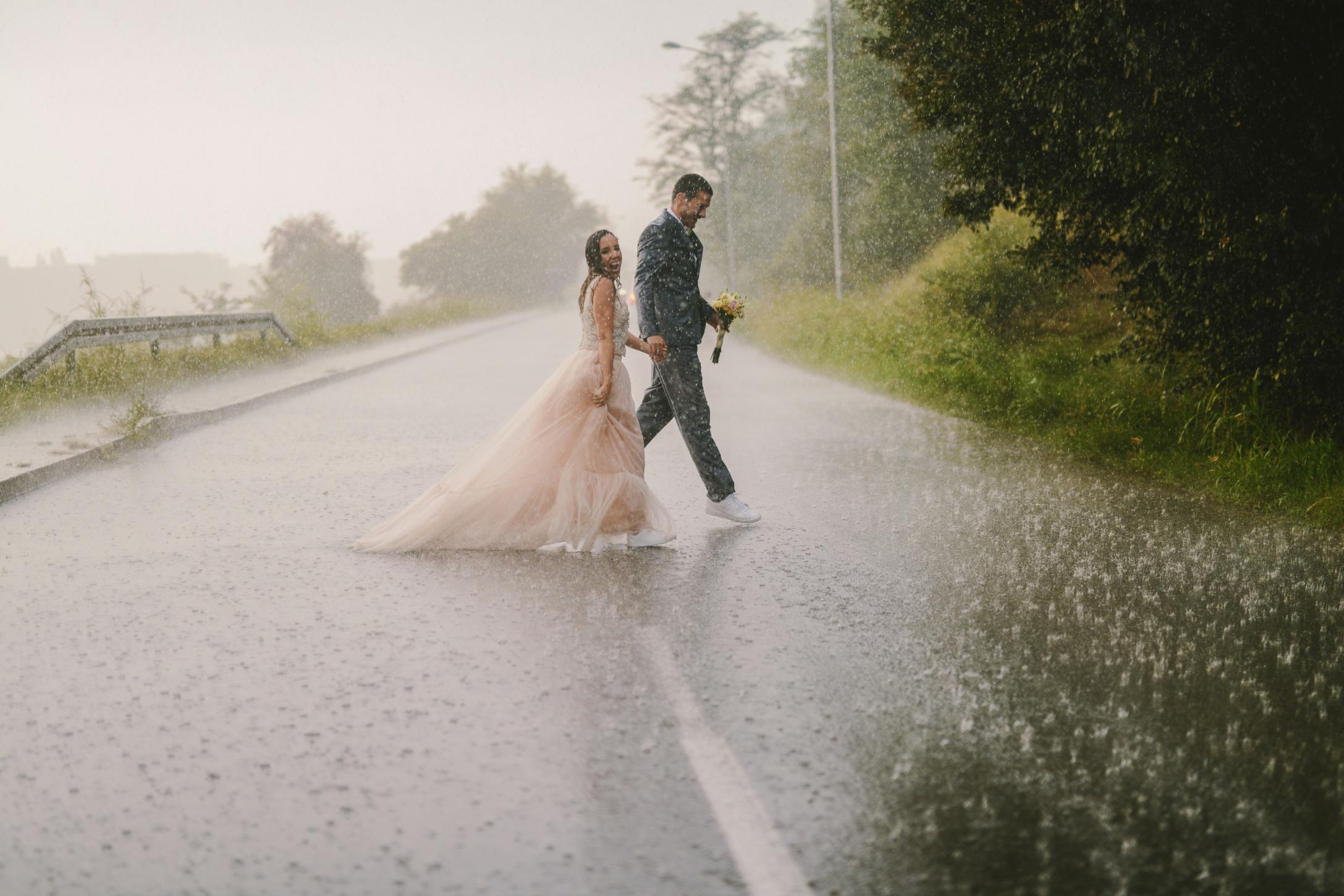How Much Does Wedding Insurance Cost in Canada?


When it comes to planning a wedding, dozens of different people, places and professionals come together to create an amazing celebration. However, with so many moving parts, there’s a risk that one or two things may not go quite as planned. Usually, these things are small and can be replaced or fixed fairly quickly – but what happens when they’re not so small?
Thankfully, wedding insurance is available to give you peace of mind and protect you should anything unforeseen happen, which means you won’t lose your money or your chance to throw your dream wedding. But how much does wedding insurance cost and is it worth it?
In this post, we’re going to explore everything to do with the cost of wedding insurance, including the average amount couples pay, what’s included with wedding insurance and when the best time to secure coverage is.
What is wedding insurance?

Wedding insurance is the insurance you can buy to cover your wedding. This means, in the event that something happens either before your wedding or on the day itself, you won’t lose out on your money.
So, if something is cancelled due to financial failure, damaged, lost or stolen, or you or a close family member is injured or sick, you won’t have to worry about losing out on potentially thousands of dollars.
What’s the average cost of wedding insurance?

In Canada, wedding insurance costs can vary based on the coverage and limits selected. Basic policies typically start around $200, with more comprehensive coverage reaching up to $2,000.
Considering that the average wedding in Canada costs approximately $30,000, it’s prudent to select a policy that offers cancellation coverage exceeding this amount. For example, a policy providing $30,000 in coverage might cost around $150; however, actual premiums will depend on the insurer and specific coverage details.
When planning your wedding, it’s essential to assess your individual needs and consult with various insurers to find a policy that offers the appropriate level of protection for your investment.
Is wedding insurance a one-off payment?

Yes, wedding insurance is a single, one-off payment. Most policies will cover you for up to two and a half years (24 to 30 months) and aren’t long-term and renewable like you might get with other policies, such as car or home insurance.
Where can you buy wedding insurance?

There are many insurance providers in Canada that offer wedding insurance, and it’s a good idea to get multiple quotes before deciding on a policy. Comparison websites, like Rates.ca, make it easy to gather and compare quotes all in one place. Using tools like a wedding budget calculator can help ensure you choose a policy that provides the right level of coverage for your specific needs.
What’s covered by wedding insurance?

What is covered by a wedding insurance policy depends entirely on the insurer and the policy you go for. When securing quotes, make sure you know exactly what the policy will include and what is covered – the last thing you want is any unwelcome surprises in the unlikely event you need to make a claim.
Thankfully, a wedding insurance policy will cover most of the large expenses associated with your wedding, including your venue, catering and transport. However, before assuming it’s covered, we recommend you check with your chosen insurer. Your policy will likely include:
- Problems with the venue, such as if they were to cancel your booking due to bankruptcy or go out of business.
- Issues with a vendor you’ve made a booking with, such as a caterer or florist going out of business last minute or not showing up at all.
- Having to cancel due to death, illness or an accident.
- Having to cancel due to redundancy.
- Having to cancel in the event that adverse weather means more than half of your guests can’t make it.
- Critical items that have been lost, stolen or damaged, including your rings and dress.
- Faults with the photos or video, or if the photographer doesn’t turn up on the day.
The good news is that a number of insurance providers now offer policies that cover your wedding if it’s taking place abroad, which is peace of mind if you’ve chosen to go for a destination wedding.
What isn’t covered by wedding insurance?

Unfortunately, should either of you change your mind at the last minute (not that it will happen, of course) and cancel your wedding, your insurance won’t cover you. Other reasons for cancelling a wedding that aren’t covered include:
- If an item that isn’t key to the wedding is lost, stolen or damaged (for example, table numbers).
- Having to cancel your wedding because you realize you’re not able to afford it.
- Having to cancel due to a preexisting medical condition.
- Poor weather, such as rain.
- Tents – these require their own insurance (though most insurers will provide tent cover).
That being said, some insurers will cover you for some of the above possibilities, though they may charge a premium. Check with your insurer before taking out a policy to make sure it covers everything you need.
If you’re getting married abroad, your travel insurance may cover you for certain items, such as your wedding attire or gifts, but you should check the single-item limit on your policy to make sure what those limits are.
Does wedding insurance cover an expensive wedding?

You can buy wedding insurance to cover any wedding, regardless of how much it might cost. However, the more money you spend on your wedding, the more you’ll have to spend on your policy.
Is your honeymoon covered by wedding insurance?

No, unfortunately, your honeymoon isn’t covered by wedding insurance. While related to your wedding, it’s still viewed as a holiday, so you’ll need to make sure you have the appropriate travel insurance policy in place. That means another cost to bear in mind when budgeting for your wedding.
What other types of insurance do you need with your wedding?

On top of wedding insurance, there are other types of wedding-related insurance you may want to consider.
If you’re renting a tent for your wedding, the majority of basic wedding insurance policies don’t include cover for this. However, there will be a tent insurance extension that you can add to your policy for an additional cost.
Another addition you might want to consider is public liability insurance. This will cover you in the event that a third party is hurt or killed and a claim against you is made. Plus, many venues require public liability cover as part of the contract. Of course, this is massively unlikely, however, just to be safe the majority of couples choose to have public liability insurance if it isn’t already covered by their wedding insurance policy. But, don’t consider this a good enough reason not to go for it, because every wedding and set of circumstances are different.
When is the best time to buy wedding insurance?

You can purchase wedding insurance up to 24 to 30 months before your wedding day. The cost of your policy won’t change whether you buy it a year in advance or just a week before, but it’s always a good idea to secure it as early as possible (and definitely before it’s too late).
Experts recommend purchasing wedding insurance as soon as you set a date and before you start making deposits. The last thing you want is to lose hundreds or even thousands of dollars if a vendor goes out of business or unexpected issues arise.
Do you really need wedding insurance?

It’s highly recommended that you get yourself wedding insurance, because – and forgive us for using a cliché – what if?
With the average wedding in Canada costing $30,000, there aren’t many couples out there who could afford to take that financial hit if the worst was to happen.
If you’re planning a small, intimate wedding — like a ceremony at a registry office — wedding insurance might not be necessary. However, for larger weddings with a bigger budget, securing wedding insurance should be a top priority to protect your investment.
Additionally, some venue and supplier contracts may include requirements or recommendations for insurance coverage, so it’s important to review these details and factor them into your planning.
Plan your wedding today with Bridebook
Here at Bridebook, we have everything you need to make planning your wedding fun, stress-free and simple. Sign up and start planning your big day today!
You Might Also Like…
- The Ultimate Canadian Wedding Budget Breakdown
- How Much Does Wedding Entertainment Cost in Canada?
- How Much Does a Wedding Venue Cost in Canada?
- How Much Does Wedding Transport Cost in Canada?
- How Much Does a Wedding Planner Cost in Canada?
- How Much Do Wedding Rings Cost in Canada?
- How Much Do Wedding Flowers Cost in Canada?


